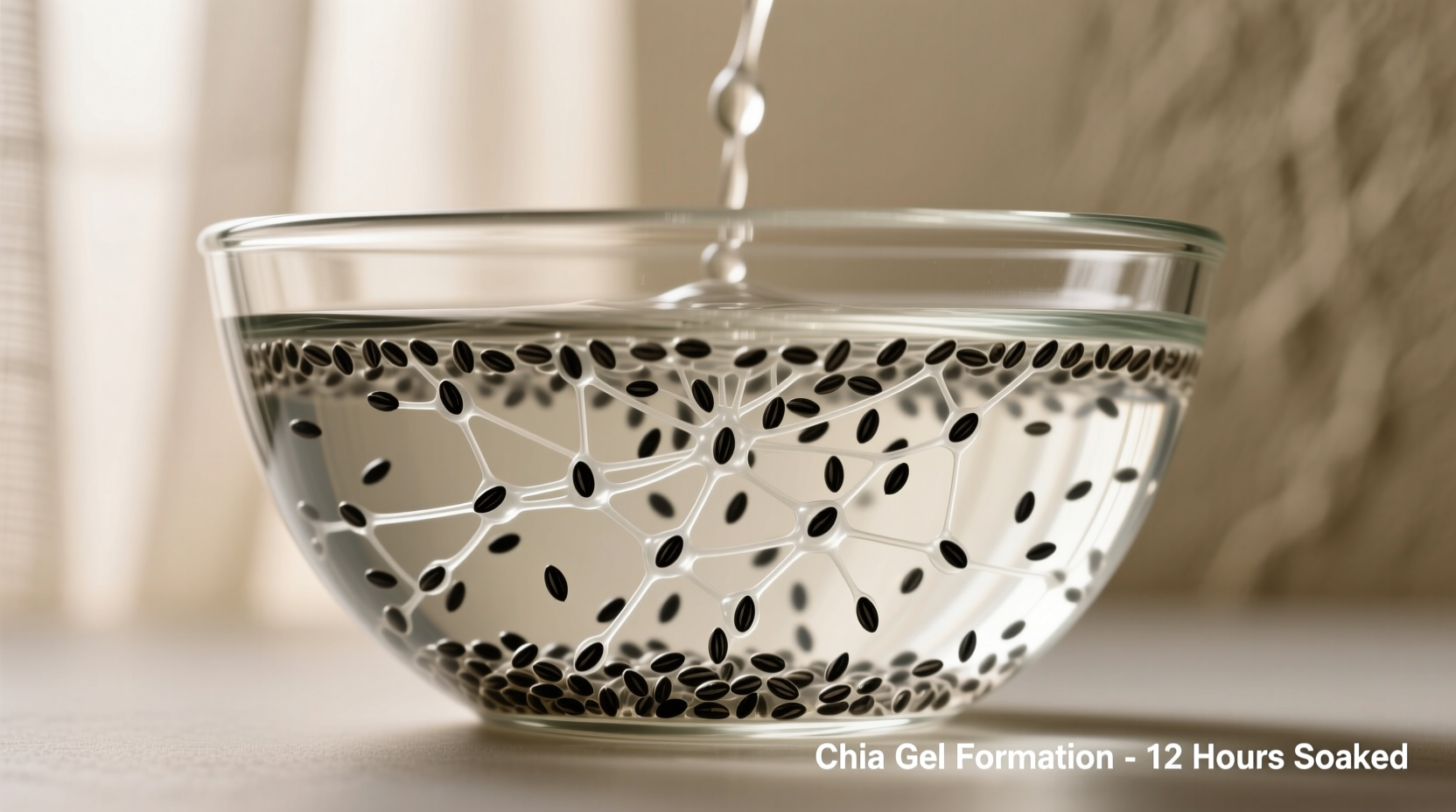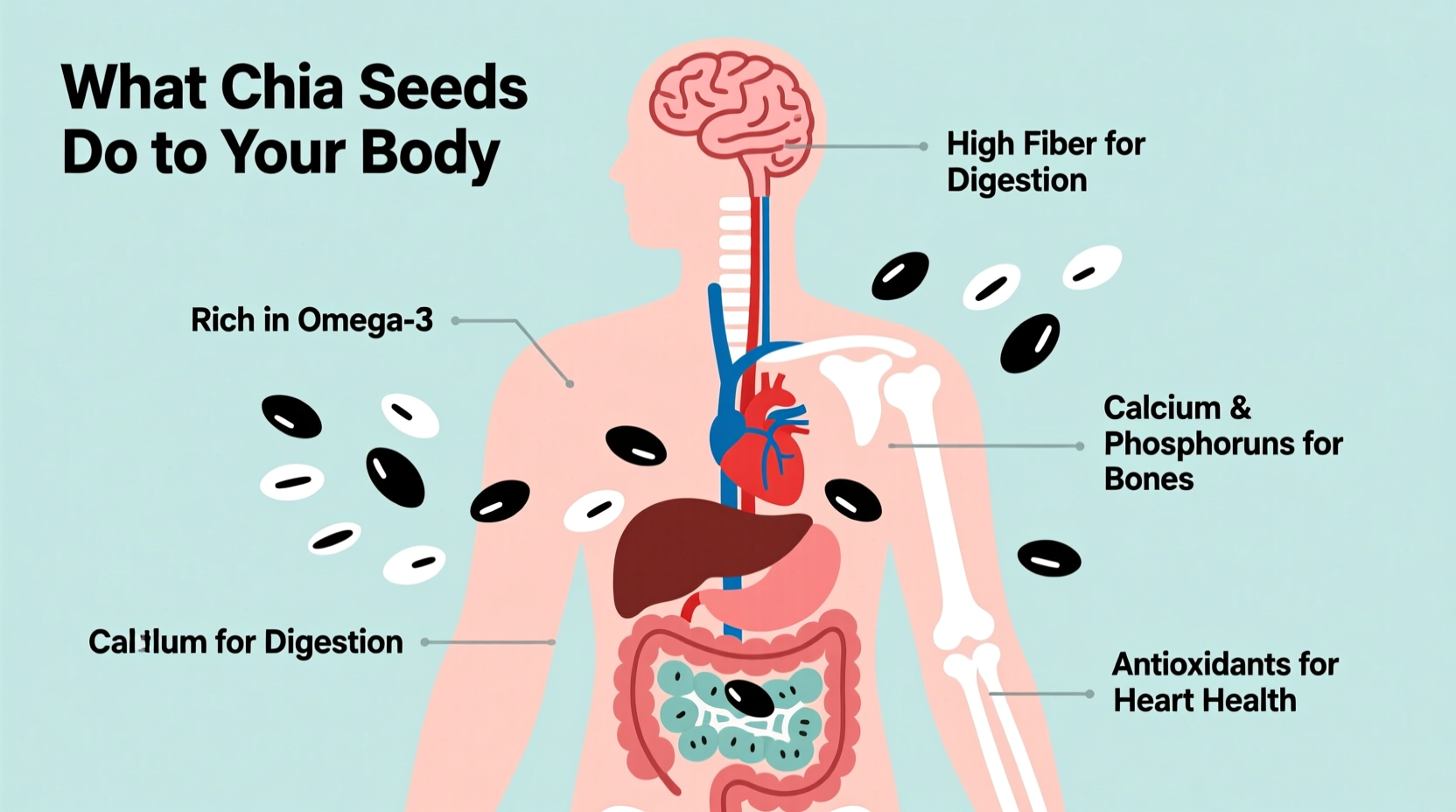Once a staple of ancient Aztec warriors, chia seeds have surged in popularity as modern research validates their remarkable nutritional profile. These tiny black and white seeds pack a disproportionate punch when it comes to supporting bodily functions. Let's explore exactly how this superfood interacts with your physiology based on current scientific understanding.
The Immediate Physical Transformation: What Happens Within Hours
When you consume chia seeds, their most distinctive property becomes immediately apparent—they absorb up to 12 times their weight in water, forming a gel-like coating. This physical transformation triggers several bodily responses:
- Hydration boost: The water-retaining property helps maintain cellular hydration levels longer than regular water intake alone
- Digestive preparation: The gel formation begins in your stomach, signaling your digestive system to prepare for nutrient processing
- Appetite regulation: Within 30-60 minutes, the expanded volume creates physical fullness signals to your brain
This immediate physical reaction sets the stage for more profound systemic effects that develop with consistent consumption.
Nutritional Powerhouse: The Science Behind the Benefits
Chia seeds' impact on your body stems from their exceptional nutritional composition. According to the USDA FoodData Central, one ounce (28g) delivers:
| Nutrient | Amount per Ounce | Daily Value % |
|---|---|---|
| Fiber | 9.8g | 34% |
| Omega-3 Fatty Acids | 4,915mg | 307%* |
| Calcium | 177mg | 18% |
| Magnesium | 95mg | 23% |
| Protein | 4.7g | 9% |
*Based on 1.6g daily recommendation for ALA omega-3s from the National Academy of Medicine

Digestive System Enhancement: More Than Just Fiber
While chia seeds' high fiber content (34% of your daily needs per ounce) explains their digestive benefits, the mechanism is more sophisticated than simple bulk addition:
- Prebiotic action: The soluble fiber feeds beneficial gut bacteria, increasing microbial diversity by up to 30% according to a 2019 study in Nutrients
- Regulated elimination: The gel formation creates optimal stool consistency, addressing both constipation and diarrhea
- Reduced inflammation: Short-chain fatty acids produced during fermentation lower intestinal inflammation markers
Unlike some fiber supplements that cause sudden digestive disruption, chia seeds provide a gradual adaptation period as your microbiome adjusts to the increased fiber intake.
Cardiovascular Protection: The Omega-3 Advantage
Chia seeds contain the highest plant-based concentration of alpha-linolenic acid (ALA), an omega-3 fatty acid with proven cardiovascular benefits:
- Blood pressure modulation: A 2012 American Heart Association study showed chia consumption reduced systolic blood pressure by 5-7 mmHg in hypertensive patients
- Triglyceride reduction: Regular consumption lowers triglycerides by approximately 20% based on clinical trials
- Anti-inflammatory effects: ALA reduces C-reactive protein levels, a key inflammation marker linked to heart disease
Unlike fish oil supplements, chia seeds provide these benefits without the risk of mercury contamination or fishy aftertaste.
Blood Sugar Regulation: The Sustained Energy Effect
One of chia seeds' most impressive physiological effects is their ability to moderate blood glucose response:
- Slowed carbohydrate absorption: The gel matrix physically slows the breakdown of carbohydrates into simple sugars
- Insulin sensitivity improvement: A 2016 study in Diabetes Care demonstrated improved insulin response in prediabetic individuals consuming chia daily
- Sustained energy release: Blood glucose levels remain stable for 2-3 hours longer compared to equivalent carbohydrate sources without chia
This makes chia seeds particularly valuable for individuals managing diabetes or seeking to avoid energy crashes throughout the day.
Contextual Considerations: When Benefits Apply and Limitations
While chia seeds offer numerous benefits, their effects depend on several contextual factors:
- Hydration requirement: Consuming chia without adequate water can cause temporary digestive discomfort as the seeds absorb moisture from your system
- Dosage matters: Benefits plateau at approximately 25g (1.75 ounces) daily - consuming more provides minimal additional benefit
- Medication interactions: Chia's blood-thinning properties may interact with anticoagulant medications (consult your physician)
- Individual variation: People with existing digestive conditions may need to gradually introduce chia to avoid discomfort
These context boundaries help explain why some individuals report dramatic benefits while others notice more subtle effects.
Practical Integration: Maximizing Benefits in Daily Life
To experience chia seeds' full physiological impact, proper preparation and consumption methods matter:
- Soaking method: Mix 1 part chia seeds with 9 parts liquid and refrigerate for 15+ minutes to maximize gel formation
- Daily timing: Consume with your largest meal for optimal blood sugar regulation
- Combination strategy: Pair with vitamin C-rich foods to enhance mineral absorption
- Gradual introduction: Start with 1 teaspoon daily, increasing over 2 weeks to prevent digestive adaptation issues
These practical approaches ensure you receive the maximum physiological benefit while minimizing potential discomfort during adaptation.
Scientific Evolution: How Our Understanding Has Developed
The recognition of chia seeds' physiological effects has evolved significantly over recent decades:
- Pre-2000s: Limited scientific attention outside traditional Mesoamerican medicine
- 2000-2010: Initial research focused primarily on omega-3 content and basic nutritional profile
- 2010-2015: Studies expanded to examine blood sugar regulation and cardiovascular effects
- 2015-Present: Research now explores gut microbiome interactions, anti-inflammatory pathways, and long-term health outcomes
This timeline reflects growing scientific appreciation for chia seeds' complex physiological interactions beyond simple nutritional composition.
Conclusion: Sustainable Integration for Long-Term Benefits
Chia seeds deliver measurable physiological benefits when incorporated thoughtfully into your diet. Their unique combination of fiber, omega-3s, and minerals creates synergistic effects that support multiple bodily systems simultaneously. Unlike many nutritional fads, chia seeds' benefits are supported by increasingly robust scientific evidence spanning digestive health, cardiovascular protection, blood sugar regulation, and inflammation reduction. By understanding both their mechanisms of action and contextual limitations, you can harness their full potential as part of a balanced nutritional approach.











 浙公网安备
33010002000092号
浙公网安备
33010002000092号 浙B2-20120091-4
浙B2-20120091-4